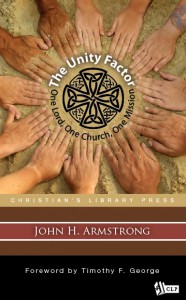 Beginning in 1908 as the “Octave of Christian Unity,” the eight days from January 18 to January 25 are designated as the “Week of Prayer for Christian Unity” and observed by many major Christian traditions and denominations.
Beginning in 1908 as the “Octave of Christian Unity,” the eight days from January 18 to January 25 are designated as the “Week of Prayer for Christian Unity” and observed by many major Christian traditions and denominations.
All around the world, Christians who sometimes do not always get along so well (to put it lightly) put aside their discord to pray for renewed harmony and reconciliation. For example, in Bucharest, Romania, ecumenical prayer services are being held on nearly every day of this week rotating between Roman Catholic, Greek Catholic, Evangelical (Lutheran), Anglican, Armenian, and Romanian Orthodox churches.
In his recent book The Unity Factor, published by Christian’s Library Press, John Armstrong outlines his vision for a deeper unity between Christians of various traditions. “Christians are called to unity in love and to unity in truth,” writes Armstrong, emphasizing the need for Christians to once again share one faith, one church, and one mission.
Furthermore, Armstrong urges that
comprehensive biblical love is the defining identity and hallmark of all true followers of Jesus. I believe this is the central truth we must recover if we want the world to take notice of our witness. Today, the world mocks much of what we say and do. A great deal of this is deserved. This, however, was not the case in the earliest centuries of the church. Christians’ deep sense of shared, familial love led them to love even more deeply. As our present world polarizes politically and socially, the church must refuse to follow the ways of the world, returning instead to this unity factor.
I hope that all Christians will take some time this week to join millions of others who pray for that “comprehensive biblical love” and “unity in truth” that characterized Christians of the ancient, united Church.
—

